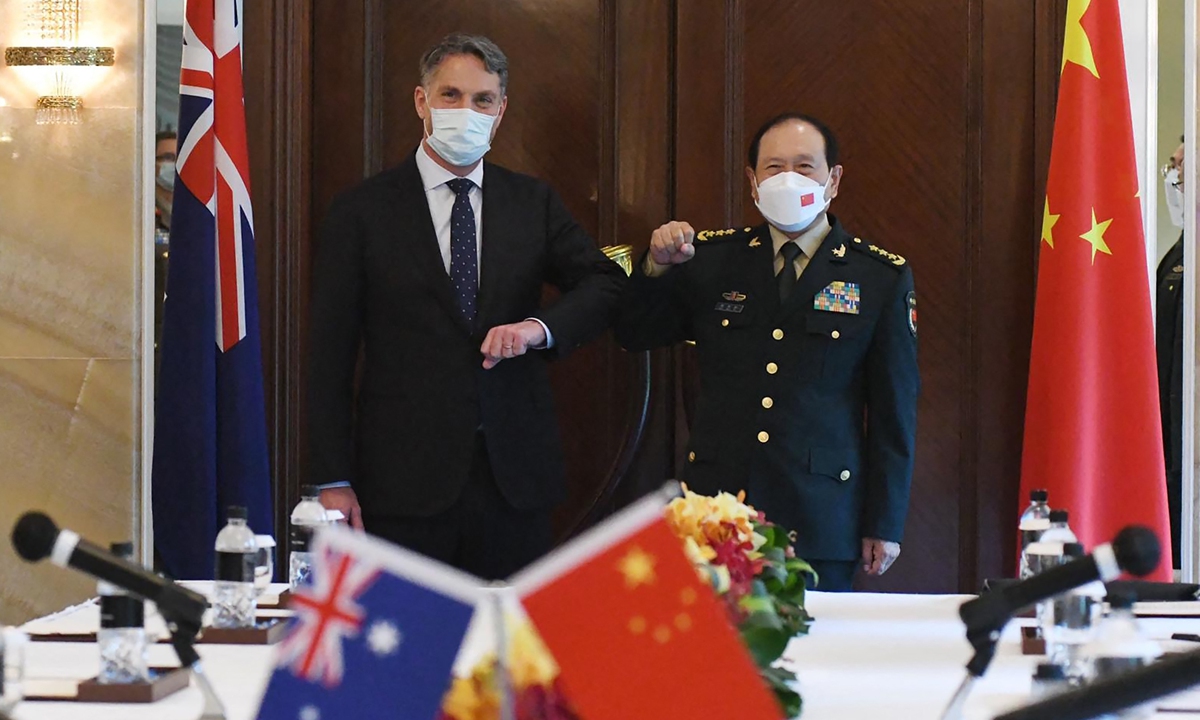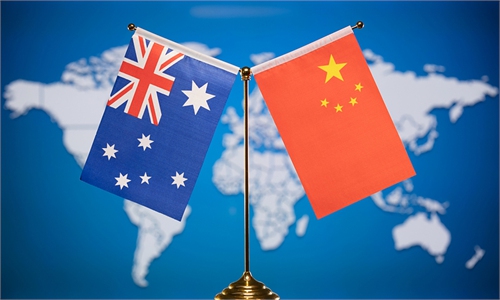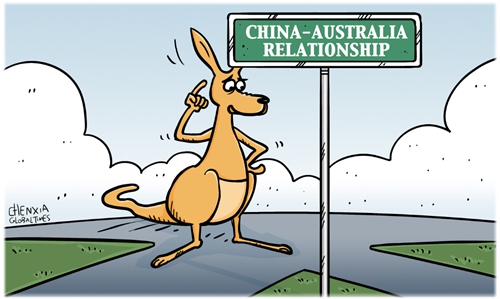
Australia's Defence Minister Richard Marles (L) meets with China's Defence Minister Wei Fenghe on the sidelines of the Shangri-La Dialogue summit in Singapore on June 12, 2022. Photo: AFP
As China's Defense Minister Wei Fenghe touched elbows with his Australian counterpart Richard Marles, also the country's deputy prime minister, to start their meeting on Sunday, lasting for over an hour, on the sidelines of the Shangri-La Dialogue, the freeze of ministerial level contact between the two governments seemed to begin its first defrost.Shortly after the end of Australia's federal parliament election on May 21, Chinese Premier Li Keqiang took the initiative to indicate China's goodwill and sincere wish to steer the bilateral relations back to the right course in his congratulatory messages to Anthony Albanese, the freshly elected Australian prime minister. He adopted a forward-looking stance to suggest that China is ready to "work with the Australian side to review the past, (and) look into the future…so as to promote the sound and steady growth of the China-Australia comprehensive strategic partnership".
Minister Wei's meeting with Marles was therefore not only of symbolic significance of a possible thaw in the diplomatic and political relations, but also a concrete further step toward mutual understanding and common ground for the improvement and development of the bilateral relations.
Since mid-2017, the previous Turnbull and Morrison governments in Canberra had impetuously followed along Washington's anti-China strategy to recklessly wreak havoc on Australia's previously constructive and mutually beneficial partnership with China. Morrison and his Defense Minister Peter Dutton had imprudently stirred up tensions, and repeatedly threatened military confrontation with China. Bilateral relations at almost all fronts, including in the political, security, economic, social and cultural spheres, had been drastically freefalling to an all-time low.
Such senseless and abusive mishandling of Australia's relationship with its biggest trade partner is absolutely irresponsible, toxic in nature with deleterious consequences not only to Australia's own national interest, but the stability and prosperity in the Asia-Pacific region as well.
China firmly believes that the relationship between different countries should not be misguided by ideological and geopolitical fixations. Mutual respect and mutual benefits are the cornerstones to the smooth and successful collaboration in today's world characterised with globalization and multilateralism.
In 1972, the Australian Labor government under Gough Whitlam, also newly elected into Prime Ministership, withstood with determination and audacity all the pressures from the domestic and international anti-China forces to establish the formal diplomatic relationship with the People's Republic of China.
Premier Zhou Enlai said sagaciously when he met with Whitlam in Beijing that "All things develop from small beginnings." Indeed, since then, bilateral relations had been undergoing momentous and substantial growth. The comprehensive strategic partnership between the two counties, forged in 2014 when President Xi Jinping visited Australia, became a springboard for a more wide-ranging, productive and profitable relationship.
There are no historical grievances or territorial disputes between China and Australia. The recent downward spiraling descent of the bilateral relations has been a tragic episode in the two countries' diplomatic history, which could only harm the common interest of both countries and peoples.
Marles is right to characterize the Shangri-La meeting as a "critical first step" to bring about concrete changes to Canberra's current relationship with Beijing.
There are, however, still some dissonances in Australia against the right course of the development toward improvement of the bilateral relations. Some political figures over and over again made the accusation that "it is China that has changed," which they somehow attribute to the deterioration of the relationship.
It is therefore necessary to remind them that China has changed from an underdeveloped country to the second largest economy in the world. Bilateral trade between China and Australia significantly grew from as little as 1972's $100 million to $230 billion in 2021. China is now Australia's largest trade partner, contributing to its economic wellbeing and prosperity.
It is simply impossible for China's changes to be impeded or reversed; they need to be recognized and interpreted as favorable and conducive to Australia's prosperous future, not to be stigmatized and demonized.
China emphasizes in its foreign policy the principle of mutual respect and mutual benefits. China does not impose its ideology, political system or social governance on other countries, while it also determinedly refuses to be willfully dictated by any other country with any political prescriptions.
It is hoped that Canberra would take concrete measures to work with China for a new and better future of the bilateral relationship. As Premier Li Keqiang rightly put it, "the sound and stable development of China-Australia relations conforms to the fundamental interests and common aspirations of the two peoples and is also conducive to peace, stability, development and prosperity in the Asia-Pacific region."
The author is president of the Chinese Association of Australian Studies and director of the Australian Studies Centre at East China Normal University. opinion@globaltimes.com.cn



